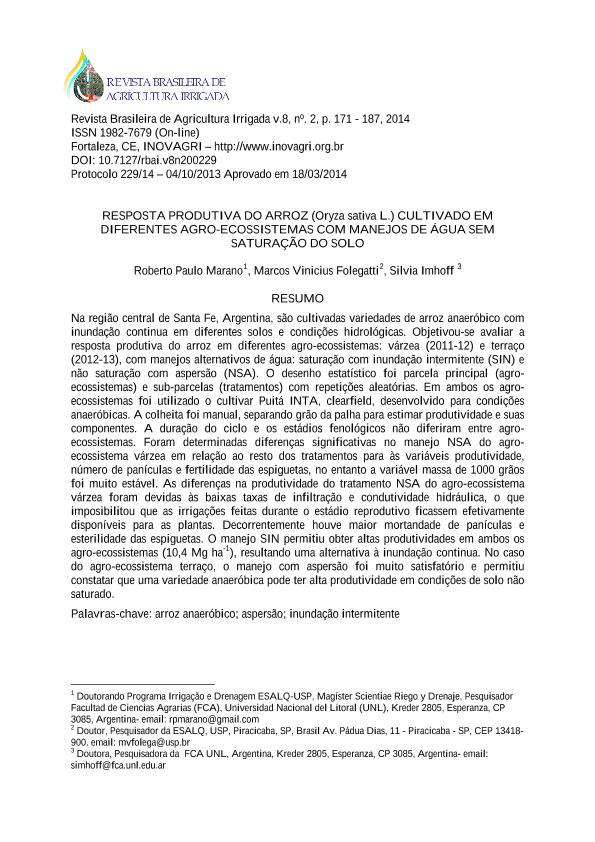Artículo
Na região central de Santa Fe, Argentina, são cultivadas variedades de arroz anaeróbico com inundação continua em diferentes solos e condições hidrológicas. Objetivou-se avaliar a resposta produtiva do arroz em diferentes agroecossistemas: várzea (2011-12) e terraço (2012-13), com manejos alternativos de água: saturação com inundação intermitente (SIN) e não saturação com aspersão (NSA). O desenho estatístico foi parcela principal (agroecossistemas) e sub-parcelas (tratamentos) com repetições aleatórias. Em ambos os agro-ecossistemas foi utilizado o cultivar Puitá INTA, clearfield, desenvolvido para condições anaeróbicas. A colheita foi manual, separando grão da palha para estimar produtividade e suas componentes. A duração do ciclo e os estádios fenológicos não diferiram entre agro-ecossistemas. Foram determinadas diferenças significativas no manejo NSA do agro-ecossistema várzea em relação ao resto dos tratamentos para às variáveis produtividade, número de panículas e fertilidade das espiguetas, no entanto a variável massa de 1000 grãos foi muito estável. As diferenças na produtividade do tratamento NSA do agro-ecossistema várzea foram devidas às baixas taxas de infiltração e condutividade hidráulica, o que imposibilitou que as irrigações feitas durante o estádio reprodutivo ficassem efetivamente disponíveis para as plantas. Decorrentemente houve maior mortandade de panículas e esterilidade das espiguetas. O manejo SIN permitiu obter altas produtividades em ambos os agro-ecossistemas (10,4 Mg ha-1), resultando uma alternativa à inundação continua. No caso do agro-ecossistema terraço, o manejo com aspersão foi muito satisfatório e permitiu constatar que uma variedade anaeróbica pode ter alta produtividade em condições de solo não saturado. In the central region of Santa Fe, Argentina, are cultivated varieties of anaerobic rice with flooding continues in different soils and hydrological conditions. This work aimed to evaluate the yield response of rice with two water management: saturation with intermittent flooding (SIF) and not saturation with sprinkle irrigation (NSS); agroecosystem lowland (2011-12) and agroecosystem upland (2012-13). The statistical design was main plot (agroecosystem) and subplots (treatments) with random repetitions. In both agroecosystems the cultivar Puita INTA, clearfield, developed for anaerobic conditions, was used. The harvesting was manual,
separating grain from straw to estimate yield and components. The cycle duration and growth stages did not differ between agroecosystems. Were determined significant differences between NSS management of lowland agroecosystem in relation to the rest of the treatments for yield, number of panicles and spikelet fertility variables, however the variable mass of 1000 grains was very stable. The differences in the yield of NSS management of lowland agroecosystem were due to the small rates of infiltration and hydraulic conductivity, which not allowed that the irrigations made at the flowering stage, remain available to plants. As a consequence, a greater death of panicles and spikelets sterility was verified. The SIF management enable to obtain high yields in both agro-ecosystems (10.4 Mg ha-1), resulting an alternative to flood continues. In the agroecosystem upland, the sprinkler management was very satisfactory and allowed to establish that an anaerobic variety can have high yield under conditions of unsaturated soil.
Keywords: anaerobic rice-sprinkle irrigation-intermittent fl
Resposta produtiva do arroz (oryza sativa l.) cultivado em diferentes agro-ecossistemas com manejos de água sem saturação do solo
Título:
Yield response of rice (Oryza sativa l.) grown in different agroecosystems with managements of water without soil saturation
Fecha de publicación:
04/2014
Editorial:
Instituto de Pesquisa e Inovação na Agricultura Irrigada
Revista:
Revista Brasileira de Agricultura Irrigada
ISSN:
1982-7679
Idioma:
Portugues
Tipo de recurso:
Artículo publicado
Clasificación temática:
Resumen
Archivos asociados
Licencia
Identificadores
Colecciones
Articulos(IAL)
Articulos de INSTITUTO DE AGROBIOTECNOLOGIA DEL LITORAL
Articulos de INSTITUTO DE AGROBIOTECNOLOGIA DEL LITORAL
Citación
Marano, Roberto Paulo; Folegatti, Marcos Vinicius; Imhoff, Silvia del Carmen; Resposta produtiva do arroz (oryza sativa l.) cultivado em diferentes agro-ecossistemas com manejos de água sem saturação do solo; Instituto de Pesquisa e Inovação na Agricultura Irrigada; Revista Brasileira de Agricultura Irrigada; 8; 2; 4-2014; 171-187
Compartir
Altmétricas




